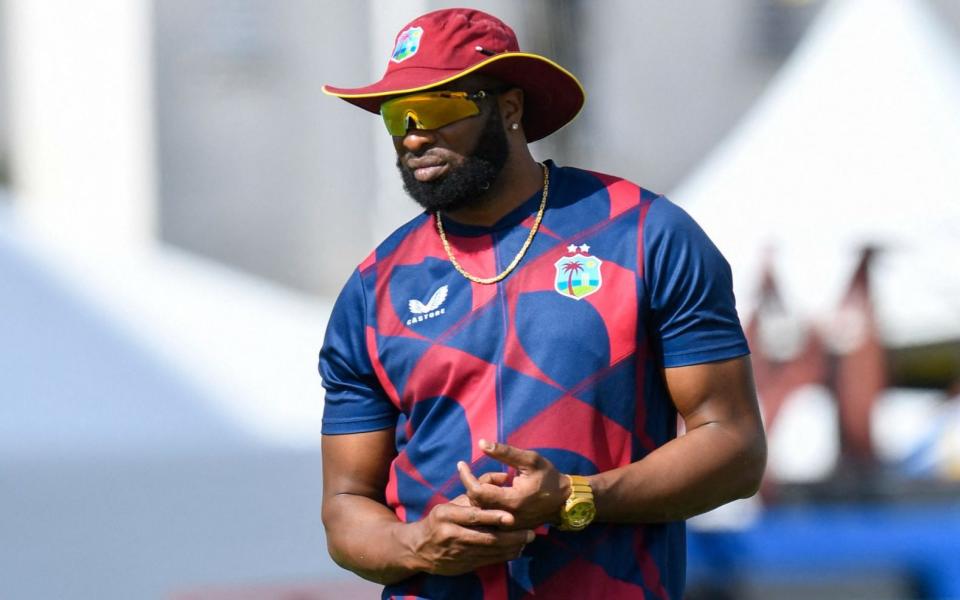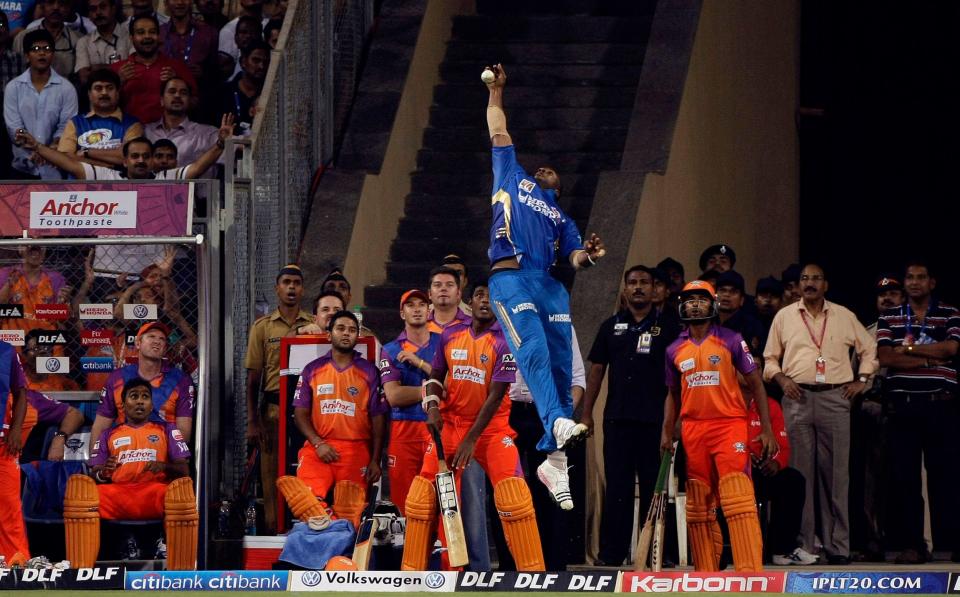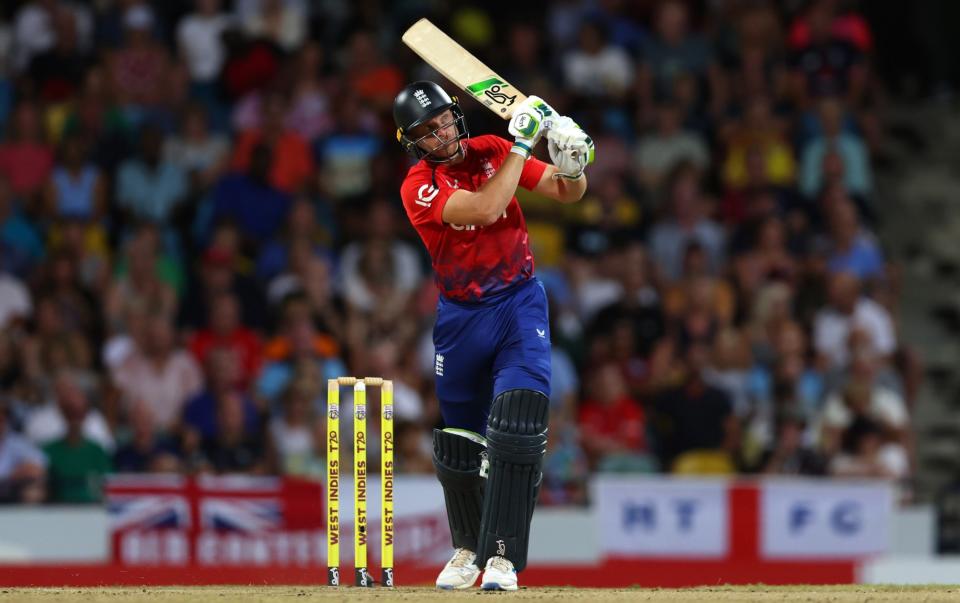England’s new T20 coach Kieron Pollard: ‘Cricket is a business’

It will be a curious sight to many: Kieron Pollard, a T20 World Cup winner with West Indies and captain as recently as 2022, now wearing an England training jersey instead.
Pollard himself would not agree. “Cricket is a business,” he explains. “You have a job to do and you just try to do it to the best of your ability.”
Such thinking underpinned Pollard’s extraordinary – and ongoing, though he has retired from the Indian Premier League and international cricket – T20 career. Pollard has played more T20 games than anyone in history: 660, including 101 for West Indies. He has hit the second most sixes and scored the third most runs. He has won five IPL titles, the T20 World Cup and an absurd 18 titles all told.
Almost as importantly, Pollard was one of the first major cricketers to reject a national central contract. In 2010, he recognised that his talent could command more as a freelance T20 player. The T20 world is one that Pollard helped to shape.
So is the game being played. In this season’s Indian Premier League, teams are scoring faster than ever before. Batsmen continue to recalibrate what is considered possible, especially in the closing stages of an innings.
Here, Pollard stands as one of T20’s seminal figures. Fifteen years ago, aged 22, Pollard played an innings that changed both his life, and the format. With Trinidad & Tobago needing 51 from 24 balls against New South Wales in the Champions League in Hyderabad, Pollard smote 47 from his next 11 deliveries. Trinidad waltzed to victory; Pollard soon won his first IPL contract, worth $750,000. He had created the template for the finisher, with the power that he generates from his 6ft 5in frame.
While Pollard bowls canny medium pace and was one of the pioneers of boundary-catching, his career was built upon his thunderous hitting. In T20, he faces an average of only 13 balls a match; what he does with them makes him one of T20’s greatest ever players.
Jos Buttler was among the first to be influenced by Pollard. In 2010, Pollard joined Somerset as overseas player; Buttler was 19 and playing his first season of the T20 Blast. During Pollard’s two seasons at Somerset, the pair forged spectacular alliances: in the 2010 semi-final, they added 75 in 6.1 overs; in the 2011 quarter-final, 66 in 4.2 overs.

“He was always special,” Pollard recalls of playing alongside the young Buttler. Sometimes, “he actually outscored me with his scoops and power”.
Pollard was struck by Buttler’s athleticism. “Jos has always been a talented individual – I’m talking in all sports. Obviously, we saw his potential with the bat and with wicket-keeping. And don’t forget how good he is at soccer as well, on the field physically and then off the field on the PlayStation. From an all-round perspective and sportsman’s perspective, he’s a well-rounded guy. He’s calm, he’s humble.”
Buttler later shared a dressing room with Pollard at Mumbai Indians. West Indies’s approach has shaped his own method.
“I heard a few guys talk about it like, ‘There’s eight overs left, if we hit five sixes in that time, we’ll win the game’,” Buttler said in 2022. “It’s certainly something I’ve thought more about: those big overs, and trusting my six-hitting ability; looking at the West Indian players and, in general, how they hit more sixes than other teams. I’ve seen that as a huge positive and a way to take pressure off myself: to know that I have the ability to hit sixes.”
Pollard was an architect of this approach: accepting more dot-balls than some batsmen prefer, but with the knowledge that his penchant for clearing the ropes allows him to target opponents ruthlessly.

‘You have to use your power or natural genetics to get ahead’
“That’s one part of simplifying how you break down the target,” Pollard explains. “Saying it and actually understanding how to do it are different things. You can just say yes, you can hit five sixes but how do you hit the five sixes? Who do you hit the five sixes against? In the Caribbean, different theories and factors are going to determine how you go about it.”
“The wickets are spinning and sometimes they’re slow,” Pollard reflects on the tournament’s pitches. “You have to use your power or your natural genetics to get ahead.”
In Trinidad & Tobago in December, Pollard and Buttler discussed how to take their partnership in a new direction. For the first time, Pollard will coach Buttler, after being recruited as consultant for the T20 World Cup.
His appointment rectifies what Rob Key identified as one of the glaring errors of last year’s dismal ODI World Cup campaign: the lack of any coach with local knowledge. With his knowledge of pitches in the Caribbean, Pollard will replicate Mike Hussey’s role during England’s T20 World Cup win in Australia two years ago. Aged 36, Pollard also brings experience playing with and against most of the tournament’s best players.
‘The computer and the brain is still ticking and working’
With Buttler, “the conversation was about the best thing for England in a World Cup,” Pollard explains. “And having the expertise and the knowledge in Caribbean conditions for the World Cup.
“In a transitional phase in my career – still playing and doing a little bit of coaching and consultancy here and there – it’s going to bode well for me in the future as well. It just came up and it was something that made sense. I’m looking forward to it.”
Watching England’s 3-2 defeat in their T20 series in the Caribbean before Christmas, Pollard gained some ideas for how they could improve. “The knowledge and the computer and the brain is still ticking and working – storing some stuff that might need to be worked on when that time comes.”
Among England’s greatest challenges will be to adapt between the wickets in different countries; the variety of Caribbean conditions is among the greatest difficulties for visiting teams. After beginning their campaign in Barbados, which suits taller and quicker bowlers, England will, all being well, need to navigate a semi-final at either Guyana or Trinidad, where spin reigns.
“That’s what the world tends to not see and understand with us Caribbean cricketers and what we endure in terms of pitches and conditions. It is totally different.”
Pollard sees his role for England as “understanding the nature of the Caribbean and how cricket plays here. We will get to know more when we sit down and meet up and discuss what is needed. Right now as it stands, it’s a broad sort of role. Hopefully, it narrows down to more tactics and different things when that time comes closer.”
Pollard is already developing the contours of his coaching style. He believes in players taking ownership, seeing a coach’s role as to add a few choice comments.
“Making sure they’re in the right frame of mind is something that is going to be very, very important,” he explains. “The most important thing is man-management: letting them realise the potential and the talent that they have and some of the things that they have not tapped into.
“Everything is time and place. And that’s from an emotional standpoint, mental standpoint now. Winning or losing a game – what needs to be said after? I think that’s very important in how you get the best out of people and a team.”
While Pollard’s contracted involvement is exclusively for the T20 World Cup – IPL commitments depending, he could join the squad for the Pakistan series from May 22 – he hopes to work with England again. “If it goes well, that will be a feather in the cap. Hopefully, they’ll see the need for someone of my experience to be with the England team.
“My job, as I’ve always done playing cricket, is to focus on what I need to do in the present. Whatever happens in the future, good or bad, you take it on the chin. You enjoy it and you continue moving on.”
Come June 28, Pollard hopes that his journey will take him to Kensington Oval for the T20 World Cup final: the second of his career, to go with the one he won with West Indies in 2012. He remains a “supporter” of West Indies, and passionate about the game in the region.
Yet, asked whether his ideal final would be England against West Indies, Pollard laughs. Then, the businessman in him speaks. “The dream final would be England vs anybody.”
Kieron Pollard is an Investor and Global Ambassador for Me + U The New Cricket shoe business for Cricketers

 Yahoo Sport
Yahoo Sport 



































































